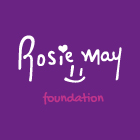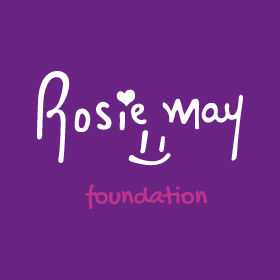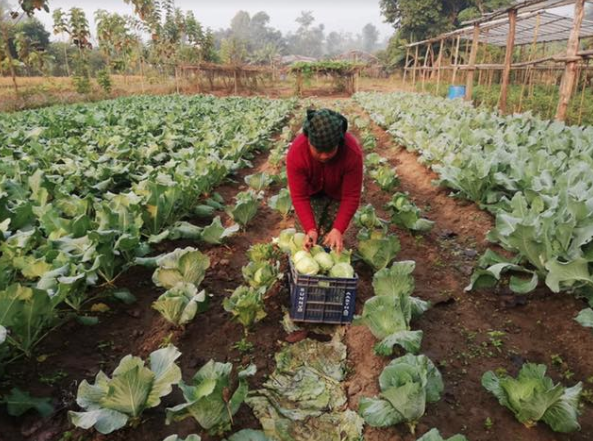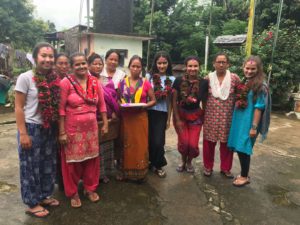
Sarah, Paige and Sasha were warmly welcomed in Nepal.
In August 2018, 3 students from the University of Nottingham took part in our International Internship Programme, researching the impact of a 30,000 litre water tank we had constructed in partnership with local NGO SAHAS Nepal, in a remote village near Chitwan National Park, Nepal. The internship programme was an incredible opportunity for the students to gain first hand experience in undertaking research for an international charity and while immersing themselves in the vibrant and friendly Nepalese culture.
Background Research
Before the water tank was constructed, families, mostly women and children, would have to walk an hour to collect water from the Nyrangi River, or pump it from various tanks. In each case, the water was unfiltered and dirty, unsafe for drinking without first being boiled. Collecting and boiling water consumes huge amounts of women and children’s time, which could otherwise be used for studying or generating an income.
Women and girls were also forced to wash in the open space of the river, often risking their own personal safety. Most families generated an income through the illegal production and sale of alcohol, a process which endangered both the health and livelihoods of families. Families’ diets consisted mainly of corn, the only crop which thrives in local conditions, placing food security at risk during periods of drought and limiting the amount of surplus food which could be sold on for income generation.
Working in partnership with a women’s farming group, made up of 21 members in the village, and NGO SAHAS Nepal, it was decided that constructing a water tank which would pipe filtered water directly into the houses of the members for use by their close and extended family and friends, would transform life in the village.
Transformational Impact of the Tank
The water tank was completed in 2018 and now pipes clean, filtered water directly into the members’ houses. A drip irrigation system is used for growing crops. Students carried out research by conducting interviews, coordinating votes at a meeting of the women’s group, observing the community and measuring indicators such as crop growth, to illustrate the tank’s impact. This research, coupled with monitoring and evaluation carried out by SAHAS, has demonstrated that the tank has so far increased:
- Safety – Clean, safe water piped directly to the village, currently serving 21 families of the women’s group, approximately 115 extended family members, with the potential to serve many more as the trade of water to other villages begins.
- Food Security– Drip Irrigation from the tank means crop yields are consistent and are unaffected by periods of drought, which has increased food security for the families of the women’s group as well as the wider community who purchase the crops.
- Health – Clean, filtered water has already improved the health of families and their livestock.
o Personal hygiene in the community has drastically improved and the risk of waterborne and skin related illness has significantly reduced, resulting in improved levels of health.
o Clean water for livestock has reduced the risk of animals contracting waterborne diseases. - Time – Women and children in the village spend significantly less time collecting and filtering water, now women have more time to increase their income generation and children have more time for studying.
- Income Generation– The 21 members of the women’s group have increased their income generation as a result of the water tank. Moving away from the illicit production of alcohol and instead growing a diverse range of cash crops with much higher yield, due to improved irrigation from the tank. Crops are traded between members and among the wider community at the community collection centre. Investing money made from crop sales into the purchase of dairy cows for selling milk, as well as using crop debris for cow feed, saving money on feed. The organic manure from cows is also used as crop fertiliser to increase crop yields. This is illustrative of an ‘integrated farming’ method, whereby multiple farming processes successfully support one another.
- Progress– Increased income for members has enabled savings groups to be established. For example, savings have been used to set up a meeting room and food store for produce to be stored before it goes to market.
- Environment– Carbon emissions and deforestation significantly reduced as there is no longer the need to cut down trees for fires to boil unclean water.
- Role models – Positive female role models have emerged to inspire future generations to replicate the success of the business model, for example a woman’s son has recently returned to the village to establish his own poultry business, rather than working overseas, based on the success of his mother’s dairy farm.
Personal Safety– Private personal space has been created for bathing, rather than public bathing in the river, reducing the risk of sexual harassment for women and girls.
- Increased social status – _increased income has enabled women to purchase livestock which culturally elevates the women’s social status.Community Unity– working towards a common goal has brought the community together.
We would like to thank Sarah, Paige and Sasha for their valuable contribution to SAHAS’ monitoring of the impact of the water tank. We are overwhelmed by the transformational changes that the tank has created for the community of Devghat so far.
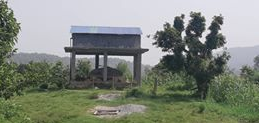
The water tank is piping water directly to houses in the village
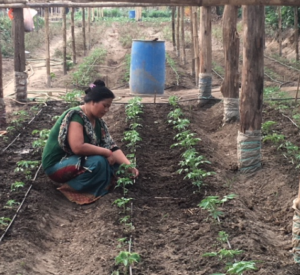
Crop growth is now diverse and bountiful, increasing food security.
